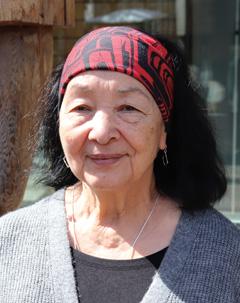This teaching calls on all of us to remember who our Ancestors are and our inherent right to self-determination. It also teaches us to uphold our responsibilities to the Lək̓ʷəŋən and W̱SÁNEĆ Peoples. We are encouraged to reflect on the ways of knowing and being that we each carry with us, respecting the values and teachings of others in becoming the best people we can be. In calling for us to remember our ancestors, this teaching encourages respect for the ways people learn, re-learn and reconnect with their Ancestors, families, teachings, languages, cultures, communities and ways of knowing.

Traditional is what we do; its meaning is in what we have always done. When our people went to other places, they knew how to behave because it was embedded in the teachings. Our traditional people had a worldview.
Goal
People
1.1.1 Include Indigenous cultural competencies in staff and faculty hiring, training and retention strategies, ensuring that all employees know the laws and histories of these territories and are prepared to live in right relationship to this place.
1.1.2 Review and revise orientation programs and materials to ensure all students, staff and faculty coming to the university understand local histories, lands and protocols.
1.1.3 Expand spaces and supports for belonging, learning and sharing in Indigenous teachings, languages, foods, arts, cultural practices and ceremony.
1.1.4 Collaborate with partners on campus to develop and deliver training programs to address anti-2SLGBTQIA+ discrimination and Indigenous-specific racism. (DRIPA Actions 3.3 & 3.8)
Learning and Teaching
1.2.1 Revise core learning outcomes for all graduating students to include Indigenous cultural competencies and knowledge of colonial histories, current realities and inherent rights to self-determination. (DRIPA Action 3.4)
1.2.2 Create core courses that meet baseline criteria and provide opportunities for students in units without Indigenous-specific courses. (DRIPA Action 3.4)
1.2.3 Ensure that programs and courses integrate and are evaluated with respect to Indigenous teaching and learning practices, ethics and knowledges. (DRIPA Action 4.5a)
1.2.4 Create opportunities for Indigenous students to engage with their own experiences, knowledges, lands and languages as well as with diverse ways of knowing and being. (DRIPA Action 4.5a)
1.2.5 Expand Indigenous language programming at all levels (from certificates to PhD) and develop and support degree programs in Indigenous languages. (DRIPA Action 4.30)
Research and Re-Searching
1.3.1 Expand and resource CIRCLE and other Indigenous-led research centres to guide university-wide ethical Indigenous research practices and protocols for community-engaged, reciprocal research.
Governance and Operations
1.4.1 Partner with local communities to align university policies and practices with Indigenous laws, ensuring that we follow local protocols and address colonial relationships with the local Peoples and land so that we are:
- creating policies for student admissions and staff and faculty hiring that prioritize members of local Nations;
- developing land stewardship initiatives and plans to heal and restore the lands occupied by the university (DRIPA Action 2.6);
- increasing the visibility and use of local languages, place names and art on campus and in communications materials (DRIPA Action 4.27); and
- updating territory acknowledgement to reflect relationships with lands and waters.
